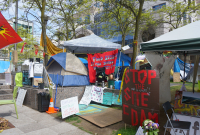Support strong Canadian climate journalism for 2025
An indigenous member of the federal Liberal caucus is breaking ranks with his colleagues on B.C.'s controversial Site C project, saying he is not convinced that two First Nations were properly consulted about the multibillion-dollar hydroelectric project.
Robert-Falcon Ouellette, MP for Winnipeg Centre, said Tuesday he still has questions about a July decision by the Fisheries and Oceans Department authorizing construction of the dam on the Peace River.
Ouellette said he plans to raise the issue with Fisheries Minister Dominic LeBlanc when Parliament resumes next week.
"I'm hoping I will ... find some reasoning behind this decision and why it was made," he said in an interview with The Canadian Press.
"I'm not convinced that, after having spoken with some of the people who were travelling across the country, that they have been consulted and talked to and I'm not sure even that we meet the UN Declaration on the Rights of Indigenous Peoples."
Ouellette's comments come after British Columbia First Nations leaders and activists condemned the federal government's approach to the Site C dam project during a Tuesday rally on Parliament Hill.
The group travelled by bus to Ottawa from B.C., making stops along the way to raise awareness about their opposition to the project that would create an 83-kilometre-long reservoir and flood farmland along with traditional First Nations territory.
The Fisheries Department maintains the July permit approval followed "extensive First Nations consultations."
"I recognize that there are those opposed to the B.C. Hydro clean energy project at Site C, but I also know that the regulatory process leading to the recent authorization to proceed was thorough and included comprehensive consultations with indigenous groups and other stakeholders," LeBlanc said in a statement.
"The authorization also includes more than 40 conditions that must be adhered to by B.C. Hydro and our department will be monitoring compliance every step of the way."
It is worth noting the approval requires B.C. Hydro to collaborate with indigenous groups, LeBlanc added.
West Moberly First Nations Chief Roland Willson said Tuesday he strongly disagrees with the suggestion his community was appropriately consulted with prior to the approval.
LeBlanc held a meeting in Vancouver only days prior to the department's decision, he added, noting the Liberals could have held off on an authorization while courts hear legal challenges on the project.
"It was well within their power to push the pause button on this until the court cases were done — they chose to ignore that," Willson said. "The one-hour meeting that we had — how does that constitute consultation?"
The federal government has also failed to explain its reasoning for approving the permit or respond to any additional questions, he said.
"We offered an olive branch and they took it and stabbed us in the face," Willson said earlier Tuesday at the rally.
Assembly of First Nations National Chief Perry Bellegarde went as far as to say the federal government's approach to the Site C dam project in British Columbia is neither in keeping with the Constitution nor with the UN declaration on indigenous rights.
"There's indigenous peoples buried throughout that valley so you're disrespecting inherent rights, you're disrespecting treaty rights," Bellegarde said during an interview with The Canadian Press last week.
Justice Minister Jody Wilson-Raybould, who was outspoken in her opposition to Site C as a B.C. regional chief for the Assembly of First Nations, has also declined to comment on her current views on the project.
In 2012, she said the project ran "roughshod" over indigenous rights.
"She paddled with us on the Peace River," Willson said. "I don't believe she's choosing not to speak. I believe she's been told, 'You have to toe the Liberal line'."
National Observer exists thanks to reader subscriptions and donations. Please subscribe today.




Comments
This article doesn't even touch on:
-70 landowners and families being evicted from their homes to make room for diverting the number 29 highway.
-83 km of the Peace River Valley being flooded, including habitat of dozens of red and blue listed plant and animal species, and enough arable land with Class 1 soil to produce food for a million people when the north of Canada is having food security issues and California is experiencing the beginning of what may be a long term drought.
-The power is not needed, and when finished it will not be salable for the cost of its generation.
-The dam will interfere with the water tables of northern Alberta and the southern NWT, neither of which have recovered from the building of the last dam on the Peace River, the WAC Bennett dam.
-The 8.8 billion dollar cost of the dam is already experiencing overruns, and will have to be paid for by taxpayers in the future, along with the $76 billion dollars that BC Hydro is already in debt for.
And the list goes on...
The need for more energy is based upon TODAY's technology. Look back 50 or 75 years to review advancement today. Recently a Vancouver High School student won 1st prize [$75,000] at an International Hight School Science fair. His project was based upon the use of water from processing sewage to generate electricity. The building of Site C is based upon purported FUTURE needs. This can lead to two errors: 1] the error of building now [co-mission], or 2] the error of not building until the need is confirmed [omission]. What are the implication of each error? The error of OMISSION would likely result in a greater cost. Whereas, the error of CO-MISSION will result in the destruction culture and land. Which error has the greatest implication?